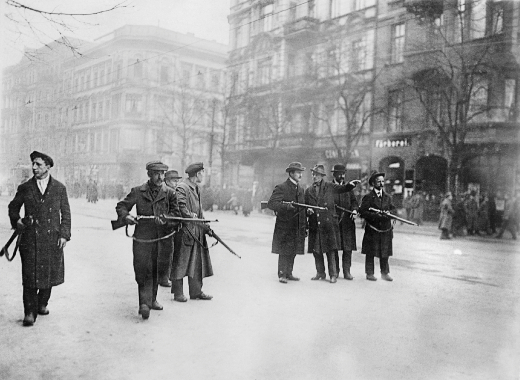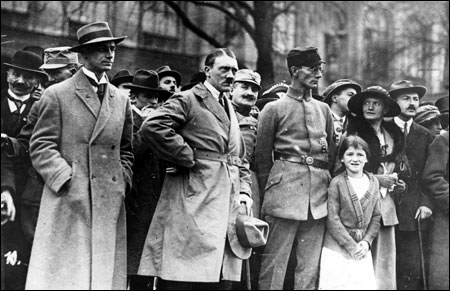1918: Kiel Mutiny -Mutiny by German Navy sailors on November 3, 1918. This event sparked the German Revolution.
1918-1919: German Revolution -Overthrow of the German monarchy. This revolution effectively caused Germany to surrender to the Allies and ended World War One.

German Communist Fighters in the German Revolution
1918-1919: Bavarian Revolution -Communist-led revolutionary government seized power in the southern German state of Bavaria (Nov. 7, 1918-May 3, 1919) suppressed by the government and the Freikorps militias. These militias developed out of groups of returning war veterans who sought to protect Germany from left-wing forces such as the Bolsheviks, and also from losing more territory to the Poles.
1919: Spartacist Revolt- Communist revolt in Berlin (Jan. 6-Jan. 15, 1919)-suppressed by the government and the Freikorps militias. The suppression of this uprising marks the end of the German Revolution. also known as the January uprising (Januaraufstand).
1919-1920: Baltic Wars of Independence
Per the Treaty of Brest-Litovsk (February, 1918), the defeated Russian government ceded huge amounts of land in western Russia (the Baltic States, Belorussia, and Ukraine) to Germany. With the Armistice ending World War One signed on November 11, 1918, the German forced in Russia were to return home, but also, per the Armistice, were not to turn over land to the Bolshevik (Communist) Russians. Many of the oppressed peoples in the occupied territories (inlcuding Poland, Estonia, Latvia, Lithuania, Finland, Ukraine), declared independence. Many of these declarations resulted in wars, with German forces stuck in the middle of several of these wars. The new German government allowed German units help the non-Communist independence movements of ethnic groups favored by the Germans (the Latvians and Finns in particular) and also allowed various Freikorps detachments to act independently to fight the communists as well.
The wars these various German Army and Freikorps units participated in include:
1918-1920: Estonian War of Independence-Helped the Estonians battle the Russian Red Army as well as Estonian communist forces allied to the Russians.
1919-1920: Latvian War of Independence--Freikorps units at first aided the Latvians battle the communists, but then joined with a White Russian (non-communist Russians) against the Latvians and Estonian allies of Latvia.
1919-1920: Lithuanian War of Independence--As in Latvia, Freikorps units at first aided the Lithuanians battle the communists, but then joined with a White Russian (non-communist Russians) against the Lithuanians.
1920: Kapp Putsch--Failed military coup against the new German government. The coup forces were led by Wolfgang Kapp, who sought to overthrow the Weimar Government.
1921: Upper Silesia (Polish) Rebellion --German and Polish militias fight prior to a vote on which nation gets the coal-rich region of Silesia.
1923-1925: French and Belgian Occupation of the Ruhr Valley---Germany fell behind in war payments to the Allies due to the collapse of the German economy. France and Belgium invade and occupy the industrial Ruhr Valley region of western Germany until the re-payments are complete. (Jan. 11, 1923-August, 1925)
1923: Hitler's Beer Hall Putsch (Nov. 8-11, 1923)-War veteran and political agitator, Adolf Hitler led his National Socialist Party in an attempted overthrow of the Bavarian government. The police crushed his uprising, and Hitler was sentenced to prison. Upon his release, he decided to win power through the electoral process. After gaining power in 1933, Hitler then began rebuilding Germany's military and set his nation on the road to World War Two.

Hitler during the Beer Hall Putsch in 1923